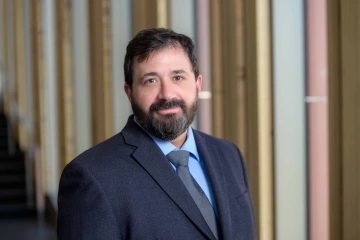Addiction study yields promising therapeutic target to promote recovery
Researchers at the U of A Health Sciences Comprehensive Center for Pain & Addiction found a medication that reduced craving for cocaine without affecting desire for sugar.

The biggest challenge to developing a medication for addiction has been inhibiting the brain’s reward pathway for drugs without also stopping the reward pathway for other things that make people happy, such as cookies.
Substance use disorders are notoriously difficult to treat, as it is challenging to intervene in a drugs’ effect on the brain’s reward pathway without interfering with the pathway’s normal function. In a University of Arizona Health Sciences study, researchers identified a drug that reduced the desire for cocaine in a murine model while keeping the brain’s reward pathways for sugar intact.
“For more than 20 years, addiction sciences researchers have been trying to come up with a treatment to reduce the propensity of people to want to use drugs. The problem is that the same areas of the brain that are turned on by addictive drugs are also turned on by all the normal things that make people happy, like pizza, a chocolate chip cookie or a phone call with a friend,” said Arthur Riegel, PhD, senior author on the paper that was published in Addiction Biology and member of the U of A Health Sciences Comprehensive Center for Pain & Addiction. “In this study, we were able to decrease the motivation to have cocaine without upsetting the normal motivation for other things in life.”

Arthur Riegel, PhD, is an associate professor in the U of A College of Medicine – Tucson’s Department of Pharmacology and a member of the Comprehensive Center for Pain & Addiction at the U of A Health Sciences.
Riegel, an associate professor in the U of A College of Medicine – Tucson’s Department of Pharmacology, led a team that tested retigabine, an anti-epileptic medication, and its effect on desire for cocaine and sugar in rats. They found that retigabine reduced drug-seeking behavior for cocaine but did not affect desire for sugar.
“I was surprised to see that retigabine treatment had no effect on the subjects receiving sucrose, but did significantly reduce administration of cocaine,” said Cody Diezel, co-first author on the paper. “I hope this study offers insight into new targets to alleviate symptoms related to substance use disorder and complement counseling and behavioral therapies.”
To conduct the study, the research team first allowed rats to self-administer cocaine and divided them into two groups: rats that selected higher doses of cocaine and became vigorous users; and rats that took lower doses of cocaine, dubbed “recreational users.” Then, both groups were given retigabine.
They found that drug-seeking behavior was reduced in all rats with a dramatic decrease among animals using low-to-mid levels of cocaine – the recreational users.
“Instead of waiting for our subjects to get to the end stage of addiction,” Riegel said, “this showed we could treat them early on and break that habit.”
Next, the rats were allowed to self-administer sucrose, or sugar, which activates the brain’s reward pathway in the same way that cocaine does. When researchers gave retigabine to these rats, they expected to see a decline in sugar-seeking behavior as they had with cocaine.
Surprisingly, the rats continued to self-administer sugar at the same levels.
“It didn’t change that behavior whatsoever,” Riegel said. “Retigabine seemed to knock down the reinforcing aspects of the addictive substance, cocaine, but left the desire for the natural substance, sugar, intact, healthy and normal.”
Retigabine is approved by the Food and Drug Administration as a treatment for epilepsy, though it fell out of favor due to the side effect of skin discoloration. Today, it is being used in clinical trials for depression, and Riegel hopes to one day partner with clinical researchers to design a clinical trial for substance use disorder.
“We’ve got a medication that seems to reduce drug seeking, relapse and drug taking. But retigabine is not going to be a magic pill that will make addiction go away,” Riegel said. “Biopsychosocial intervention counseling is what does the heavy lifting in treating substance use disorders. Our goal is to come up with a treatment that could help stabilize the patient and make it a little bit easier to stop using the drug long term.”
Co-first author Esteban Urena, a second-year medical student at the College of Medicine – Tucson, added, “I hope this study will help advance research on medications for cocaine use disorder. I believe this research will eventually lead to new treatments that can work alongside behavioral therapies to better support people dealing with cocaine use disorder and improve their chances of recovery.”
Urena, who worked in the Riegel Lab for about two years, said working on the study shifted his long-term career interests.
“At first I was interested in specializing in emergency medicine, but after gaining a better appreciation of the science behind substance use disorders, I want to have a more direct impact and specialize in family medicine,” Urena said.
Working in the Riegel Lab for three years also had a lasting impression on Diezel, who is now a first-year doctoral student in medical pharmacology.
“I was always interested in medicine and initially thought I wanted to become a medical doctor,” Diezel said. “However, after spending time in the lab, I realized that I am passionate about exploring both the functions of the body and how pharmaceuticals influence those processes in a research setting. In Dr. Riegel’s lab and through the medical pharmacology program, I have the opportunity to explore these interests and discover new insights that have yet to be uncovered.”
This research was funded in part by the National Institute on Drug Abuse, a division of the National Institutes of Health, under award no. R01DA046476.
Experts
Arthur Riegel, PhD
Associate Professor, Department of Pharmacology, U of A College of Medicine – Tucson
Member, Comprehensive Center for Pain & Addiction, U of A Health Sciences
Contact
Stacy Pigott
U of A Health Sciences Office of Communications
520-621-7239 ofice | 520-539-4152 cell, spigott@arizona.edu

